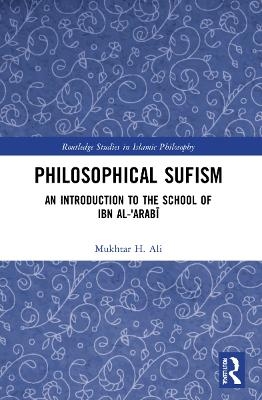
Philosophical Sufism
Routledge (Verlag)
978-1-032-01929-1 (ISBN)
Analyzing the intersection between Sufism and philosophy, this volume is a sweeping examination of the mystical philosophy of Muḥyī-l-Dīn Ibn al-ʿArabī (d. 637/1240), one of the most influential and original thinkers of the Islamic world. This book systematically covers Ibn al-ʿArabī’s ontology, theology, epistemology, teleology, spiritual anthropology and eschatology.
While philosophy uses deductive reasoning to discover the fundamental nature of existence and Sufism relies on spiritual experience, it was not until the school of Ibn al-ʿArabī that philosophy and Sufism converged into a single framework by elaborating spiritual doctrines in precise philosophical language. Contextualizing the historical development of Ibn al-ʿArabī’s school, the work draws from the earliest commentators of Ibn al-ʿArabī’s oeuvre, Ṣadr al-Dīn al-Qūnawī (d. 673/1274), ʿAbd al-Razzāq al-Kāshānī (d. ca. 730/1330) and Dawūd al-Qayṣarī (d. 751/1350), but also draws from the medieval heirs of his doctrines Sayyid Ḥaydar Āmulī (d. 787/1385), the pivotal intellectual and mystical figure of Persia who recast philosophical Sufism within the framework of Twelver Shīʿism and ʿAbd al-Raḥmān Jāmī (d. 898/1492), the key figure in the dissemination of Ibn al-ʿArabī’s ideas in the Persianate world as well as the Ottoman Empire, India, China and East Asia via Central Asia.
Lucidly written and comprehensive in scope, with careful treatments of the key authors, Philosophical Sufism is a highly accessible introductory text for students and researchers interested in Islam, philosophy, religion and the Middle East.
Mukhtar H. Ali is a Research Fellow at the Warburg Institute, School of Advanced Studies, University of London. He specializes in Sufism, Islamic philosophy and ethics, and has published widely in various peer-reviewed venues. He has also translated several works in classical and contemporary Islamic metaphysics, which include The Principles of Correspondences (2013) and The New Creation (2018) and The Horizons of Being: The Metaphysics of Ibn al-ʿArabī in the Muqaddimat al-Qayṣarī (2020).
Introduction 1. Ontology 2. The Divine Names and Attributes 3. Divine Knowledge 4. The Origin of Multiplicity 5. The Universal Worlds 6. The Imaginal World 7. Unveiling 8. The Human Vicegerency 9. The Existential Circle 10. The Supreme Spirit in the Microcosm 11. Prophethood, Messengership and Sainthood 12. Resurrection Conclusion Bibliography
| Erscheinungsdatum | 22.09.2021 |
|---|---|
| Reihe/Serie | Routledge Studies in Islamic Philosophy |
| Zusatzinfo | 1 Line drawings, black and white; 1 Illustrations, black and white |
| Verlagsort | London |
| Sprache | englisch |
| Maße | 156 x 234 mm |
| Gewicht | 426 g |
| Themenwelt | Geisteswissenschaften ► Philosophie ► Östliche Philosophie |
| Geisteswissenschaften ► Religion / Theologie ► Islam | |
| Sozialwissenschaften ► Soziologie ► Spezielle Soziologien | |
| ISBN-10 | 1-032-01929-8 / 1032019298 |
| ISBN-13 | 978-1-032-01929-1 / 9781032019291 |
| Zustand | Neuware |
| Haben Sie eine Frage zum Produkt? |
aus dem Bereich


